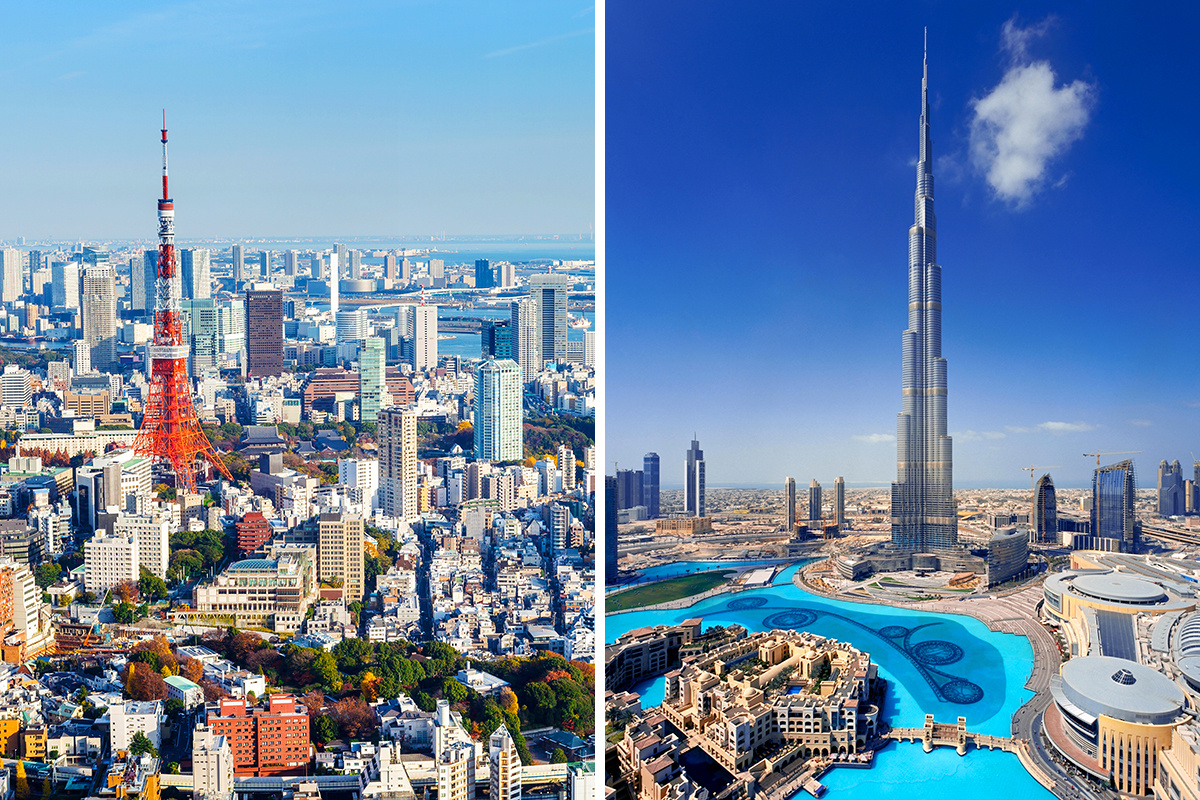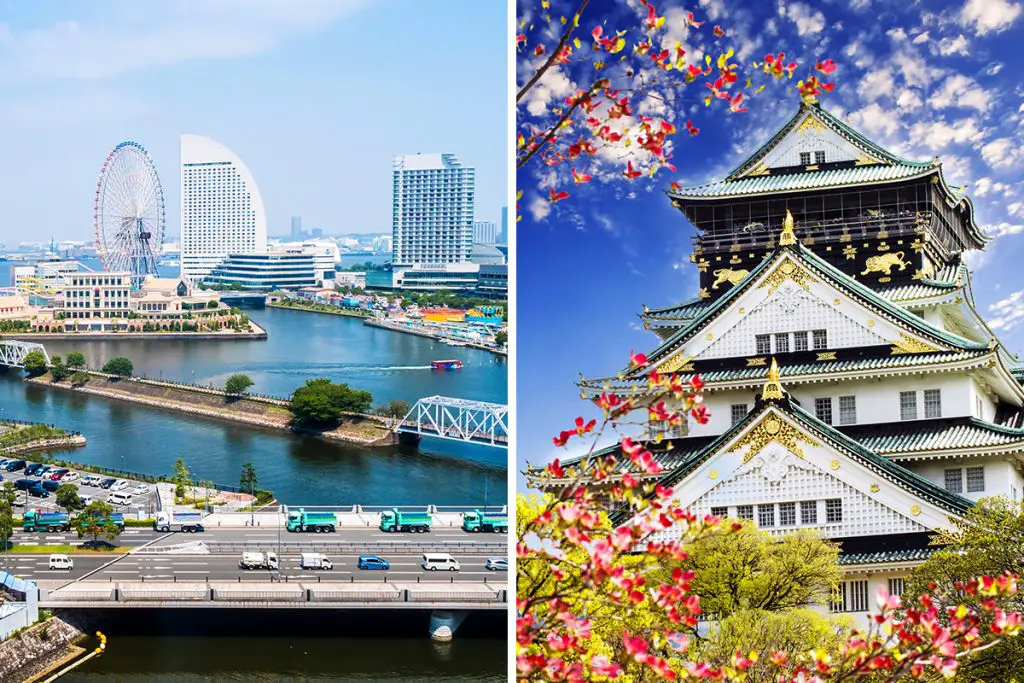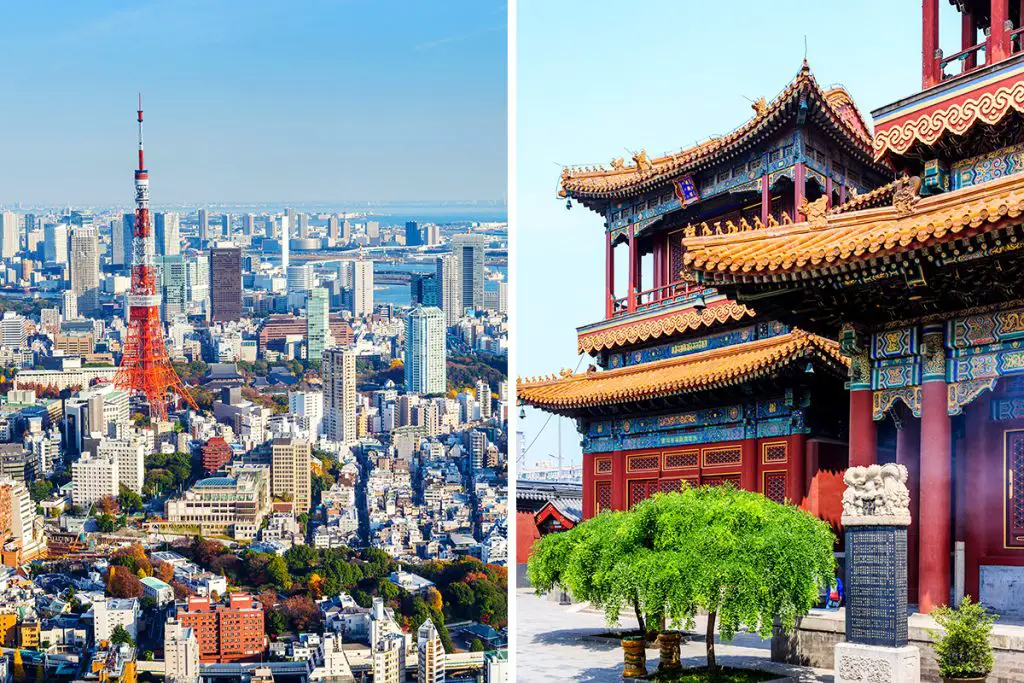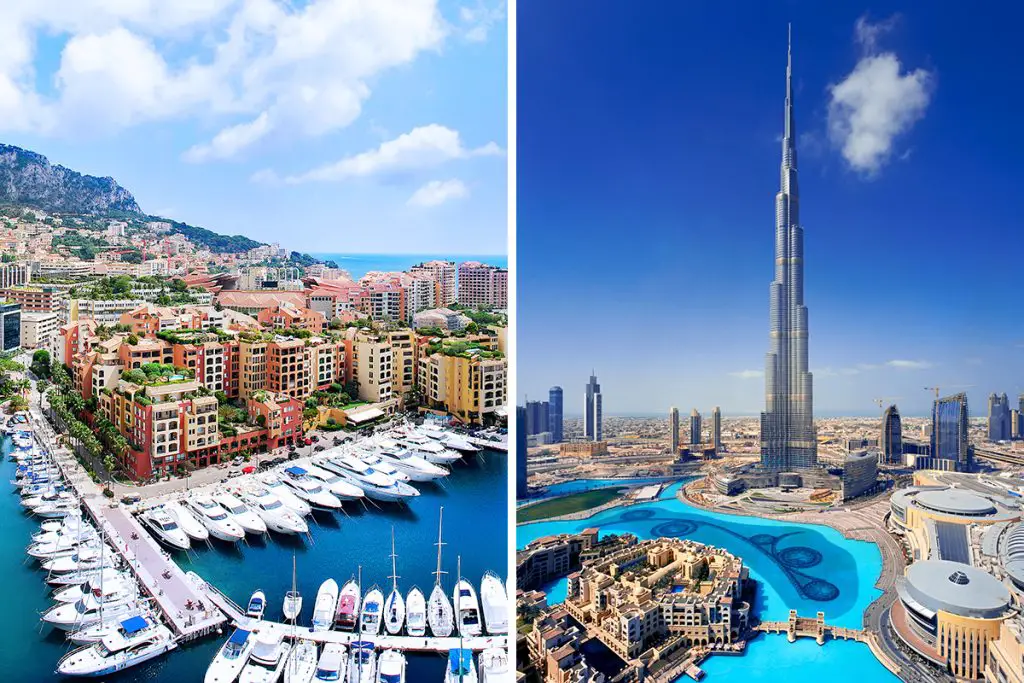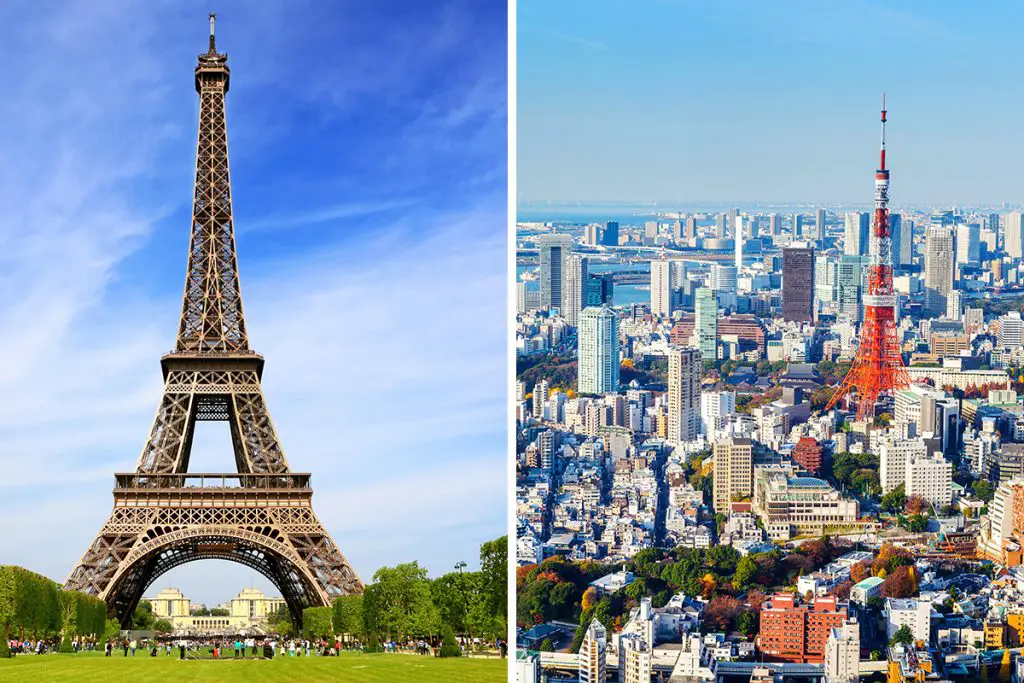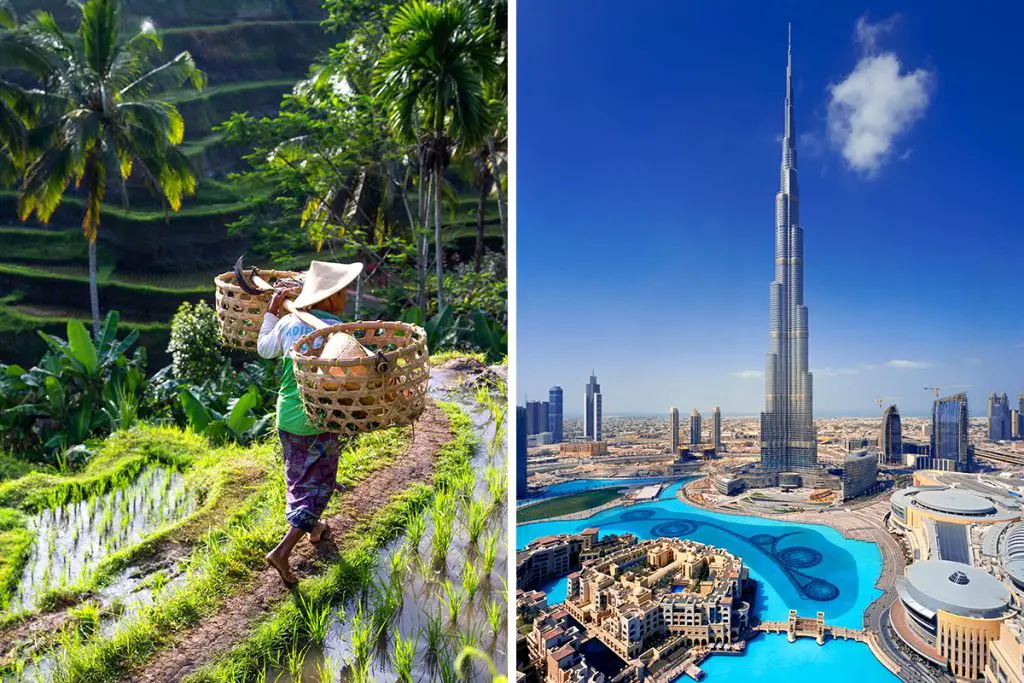Decisions, decisions! The allure of Tokyo’s ancient temples might be calling your name, while the shimmering skyline of Dubai whispers promises of luxury and adventure. Here, you have two cities, each a jewel in its own right, offering different but equally captivating worlds. Time to dig deeper and weigh your options!
History & Culture
First things first, let’s talk about something close to the heart of any city: its history and culture. These two elements make each place unique and tell us a lot about what to expect when we visit.
Tokyo’s roots are deep. It started as a small fishing village named Edo. As you wander its streets, you might notice pockets of history like ancient shrines and traditional arts.
In Tokyo, you’ll find a living, breathing culture that dates back centuries, preserved even amid the buzzing life of a modern metropolis. Geisha performances, tea ceremonies, and even the delicate art of flower arrangement (Ikebana) have survived the passage of time.
Dubai, on the other hand, is relatively young but has made history in the blink of an eye. It used to be a small desert town, mostly known for pearl diving. Fast-forward to now, and it’s a global hot spot for business and tourism.
The city is like a youngster that’s eager to show off its shiny new toys, like some of the world’s tallest buildings and most luxurious hotels. Traditional Bedouin culture does exist but is often overshadowed by the city’s rapid modernization.
So, how do Tokyo and Dubai stack up against each other culturally? Tokyo offers you a blend of the past and the present. Here, it’s as if time stands still when you step into a centuries-old temple yet speeds up as you catch a train to the next high-tech district.
Dubai gives you a glimpse of the future. Its modern architecture and advanced technology might make you feel like you’ve stepped into a science fiction movie. The old and the new coexist, but the scales tip toward modern luxury and innovation.
In summary, if you’re drawn to ancient traditions and a deep-rooted sense of history, Tokyo will captivate you. But if the pull of the future excites you, Dubai’s fast-paced evolution is hard to resist. Both cities offer a glimpse into how the old and new can coexist, but the emphasis varies. Where do you see yourself being most inspired?
Attractions & Activities
When you’re plotting your dream vacation, attractions and activities play a vital role in your decision. You’re not just looking for a pretty view, but for experiences that will make your trip unforgettable. Let’s dig into what Tokyo and Dubai have to offer in terms of must-see places and must-do activities.
Tokyo is often synonymous with its iconic landmarks like the Tokyo Tower, which stands at 332.9 meters (about 1,092 feet) tall. Here, you can catch panoramic views of the city, perfect for those Instagram photos.
Then there’s Akihabara, a district that brings the world of anime and electronics to life. You can spend hours exploring these bustling streets, or perhaps you’d be more interested in a sumo wrestling match. These hefty athletes bring a level of intensity to their sport that’s hard to match anywhere else.
In contrast, Dubai is all about opulence and scale. The Burj Khalifa, the world’s tallest building at 828 meters (about 2,717 feet), offers sky-high views that will take your breath away. The city’s vast deserts provide a playground for dune bashing, a high-adrenaline experience that involves racing 4×4 vehicles over sand dunes.
Then there’s the Dubai Fountain, where you can watch water dance to music in a display that rivals famous fountains around the world.
Now, let’s talk about nature. Tokyo offers a break from its bustling city life with beautiful gardens like Shinjuku Gyoen. Here, you can take a peaceful walk among cherry blossoms, particularly during the cherry blossom season in spring.
In Dubai, nature comes in the form of the Arabian Desert. A camel safari is a tranquil way to explore this vast, beautiful landscape and get a taste of Bedouin life.
In summary, Tokyo pulls you in with a blend of old and new, from towering landmarks to ancient arts, all infused with a touch of nature. Dubai thrills with its feats of modern engineering and adrenaline-pumping desert adventures. Your choice between Tokyo and Dubai really boils down to whether you want a vacation steeped in culture or one that pushes the boundaries of luxury and thrill.
Beaches
Now, let’s talk about something that often seals the deal for many travelers: beaches. Whether you’re a sun worshipper or you love the sound of waves, beaches can be the cherry on top of a perfect vacation. Let’s see how Tokyo and Dubai compare.
In Tokyo, the closest beach is probably Odaiba Beach, about 9 miles (roughly 14.5 km) from the city center. While it’s not a natural beach, it provides a view of the Rainbow Bridge and Tokyo’s skyline. The sand is golden, but swimming isn’t recommended due to water quality.
Dubai, on the other hand, is home to the world-famous Jumeirah Beach, approximately 12 miles (around 19.3 km) from downtown. The pristine waters of the Arabian Gulf lap against fine, white sands. Unlike Odaiba, swimming is not just allowed but is a major attraction here, given the clear, warm water.
When it comes to water activities, Tokyo is more subdued. The focus is often on leisurely strolls or sitting by the water to take in the view. Dubai, however, amps up the excitement with water sports like jet skiing and parasailing, giving you a full-throttle beach experience.
In terms of facilities, Tokyo’s beaches are generally less equipped, often lacking amenities like showers or sun loungers. Dubai’s beaches, meanwhile, tend to offer more in terms of facilities, from beachside cafes to well-maintained restrooms.
To wrap it up, if beaches are a major part of your vacation dreams, Dubai has the upper hand with its crystal-clear waters and numerous amenities. Tokyo offers a more laid-back, reflective beach experience, more suited for those looking to escape the city’s hustle and bustle for a while. Where do you see yourself soaking up the sun?
Eating, Drinking & Nightlife
Let’s dive into one of the most flavorful parts of any trip: the food, drinks, and nightlife. Whether you’re a foodie, a party animal, or just someone looking to enjoy local flavors, the cities of Tokyo and Dubai have got you covered. But how do they compare?
When it comes to eating, Tokyo is a paradise for sushi lovers, ramen enthusiasts, and tempura fanatics. Tsukiji Fish Market is where you can get the freshest sashimi and other seafood treats. Don’t overlook the lesser-known but equally amazing yakitori (grilled chicken skewers) joints tucked away in tiny alleys.
On the other hand, Dubai offers an international smorgasbord from fine dining to street food. Shawarma stands, hummus, and falafel are easy to find and delicious to eat.
For drinks, Tokyo is the place to explore if you’re curious about sake or Japanese whisky. Izakayas, or Japanese pubs, offer a cozy atmosphere where locals enjoy beer and small bites.
Dubai, however, has a different vibe. Being in a Muslim-majority country, alcohol is only served in licensed venues, like hotels. The focus is more on coffee and fresh juices, with an abundance of cafes serving strong Arabic coffee.
Now, for nightlife. Tokyo is known for its karaoke bars, where you can sing your heart out with friends or even strangers. Clubs in Shibuya and Shinjuku districts keep the city awake until the wee hours. Dubai provides a more luxe nightlife experience, with rooftop lounges, beach clubs, and high-end bars, usually located within hotels.
To sum up, Tokyo serves a feast for the senses with its rich culinary variety, a long-standing tradition of drinks like sake, and vibrant nightlife scenes. Dubai offers international flavors, a more restricted but still interesting drinking scene, and swanky nightlife venues. Each city provides a distinct approach to dining, drinking, and entertainment, so what’s your style?
Shopping
Ah, shopping—a traveler’s delightful pastime. Whether you’re hunting for unique keepsakes or splurging on luxury items, both Tokyo and Dubai offer shopping experiences you won’t soon forget. But let’s get into the nitty-gritty of it all.
In Tokyo, the Shibuya and Harajuku districts are the go-to spots for trendy fashion and quirky items. Manga stores, tech shops, and unique local brands are plentiful. Don’t miss out on the famous Takeshita Street in Harajuku for some of the most eclectic fashion finds.
If you’re into electronics, Akihabara is your haven, featuring everything from the latest gadgets to vintage video games.
Dubai, conversely, is the epitome of luxury shopping. Malls like The Dubai Mall and Mall of the Emirates house high-end brands like Gucci, Chanel, and Louis Vuitton. But it’s not just about international brands. The Gold Souk is a fascinating market where you can buy jewelry and precious stones, while the Spice Souk offers a myriad of aromatic treasures.
In a nutshell, Tokyo offers a diverse range of shopping options, often leaning towards trendy and tech-savvy products. Dubai focuses more on luxury and opulence but also gives you a taste of traditional Middle Eastern markets. Both cities offer a captivating shopping experience, but where you’ll enjoy it most depends on your personal tastes and what you’re looking to take home.
Accommodation
Where you lay your head at night is a big part of your travel experience. Let’s compare the accommodation options in Tokyo and Dubai to help you pick the right fit for you.
Tokyo’s lodging scene offers everything from capsule hotels, where you sleep in a small, pod-like room, to traditional ryokans, which are Japanese-style inns complete with tatami floors and futons. Budget travelers can find hostels in neighborhoods like Asakusa, while luxury seekers might opt for five-star hotels in districts like Roppongi or Shinjuku.
Dubai takes luxury to another level. Think 7-star hotels like the Burj Al Arab, where you’re treated like royalty. Budget options do exist but are less common. Many hotels offer fantastic views of the city’s skyline or even the Arabian Desert. Plus, most hotels in Dubai come with swimming pools because of the hot climate.
In Tokyo, space is at a premium, so rooms might be smaller than you’re used to. Dubai hotels, on the other hand, usually offer more spacious rooms and suites. They also often come with a range of amenities like saunas, gyms, and sometimes even a mall.
So, are you in the mood for a compact yet cozy room that puts you in touch with Japanese culture? Or would you prefer a spacious suite that screams luxury and comes with a view to match? Both cities offer unique stays, but your choice will depend on your budget and what you prioritize in accommodation.
Family-Friendliness & Children’s Activities
Planning a family vacation? The destinations you pick should not only thrill you but also keep the little ones engaged. Here’s how Tokyo and Dubai stack up in terms of family-friendliness and activities for children.
Tokyo is home to famous theme parks like Tokyo Disneyland and Tokyo DisneySea. Plus, the city has an array of museums designed specifically for kids, like the Tokyo Toy Museum and the Ghibli Museum, dedicated to the animated films of Studio Ghibli. Even taking a boat ride on the Sumida River can be a fun family activity.
Dubai also has its share of family-friendly spots, including theme parks like Legoland Dubai and IMG Worlds of Adventure. The Dubai Aquarium is an excellent place for kids to learn about marine life, and the Dubai Fountain can be mesmerizing for children and adults alike.
Both cities are generally safe and offer excellent public amenities, including clean and accessible restrooms. However, Tokyo’s public transport might be easier to navigate with a stroller compared to Dubai, where you might be more reliant on taxis.
So, whether it’s roller coasters, learning, or just spending time together, both Tokyo and Dubai offer plenty of options for families. Your decision might just hinge on whether you’re more drawn to traditional cultural experiences or modern-day extravaganzas.
Getting There & Getting Around
Now let’s get into the logistics: how do you get to these incredible cities and how easy is it to get around once you’re there?
To fly into Tokyo, you’ll most likely land at either Narita International Airport, about 37 miles (approximately 60 km) away, or Haneda Airport, about 11 miles (around 18 km) from the city center. Dubai International Airport serves as the main gateway to Dubai and is roughly 3 miles (about 5 km) from the city center.
Once in Tokyo, the city’s intricate train and subway system is your best friend. You can even use it to reach far-off suburbs and other cities. Just remember that it can get really crowded during rush hours. Dubai, on the other hand, has a metro system, but it doesn’t cover the whole city. You might find yourself using taxis or even boats known as dhows for some trips.
In summary, Tokyo offers a more extensive public transportation network that’s better suited for budget travel and can be more accommodating for families. Dubai leans more towards private and luxurious travel options but is still straightforward to navigate. Both cities offer their own unique travel experiences, so what’s it going to be?
Weather
Weather plays a significant role in how you experience a destination. Let’s weigh the meteorological pros and cons of Tokyo and Dubai to see which suits your climate comfort zone better.
Tokyo experiences four distinct seasons. Spring (March to May) is when the city’s cherry blossoms bloom, offering mild temperatures around 60–70°F (15–21°C). Summer (June to August) can be hot and humid, reaching up to 86°F (30°C). Fall (September to November) is cool and comfortable, and winter (December to February) can go as low as 35°F (2°C).
Dubai, on the other hand, has a desert climate. Summers from June to September can be incredibly hot, with temperatures often exceeding 104°F (40°C). Winters are more moderate, with January temperatures ranging from 57–75°F (14–24°C). There isn’t much variation, and you won’t find any cherry blossoms here!
In Tokyo, you’ll also encounter the rainy season in June and July, whereas Dubai sees very little rainfall throughout the year. This can be a blessing or a curse depending on how you view rain.
In summary, if you prefer a destination with seasonal changes, Tokyo is the place to be. But if constant sunshine and warm weather are more your style, then Dubai should be at the top of your list.
Safety
When you’re out exploring, you also want to feel safe and secure. So how do Tokyo and Dubai fare when it comes to safety?
Tokyo is renowned for being one of the safest cities in the world. Violent crime is extremely rare, and petty crime like pickpocketing is not common either. You can often see young children taking public transportation on their own.
Dubai also boasts a low crime rate, especially compared to other global cities. Strict laws contribute to this, but those same laws can catch tourists off guard. For example, public displays of affection are not tolerated, and there are stringent rules against alcohol consumption in public areas.
Unique to Tokyo, the city is prepared for earthquakes and has stringent building codes to minimize risk. Dubai, on the other hand, often faces extreme heat conditions, and many indoor facilities are well-equipped with air conditioning to cope with this.
Both cities prioritize your safety but in different ways. Tokyo offers a sense of everyday security, while Dubai provides safety through strict laws. Each city has its own set of rules and natural challenges, so your comfort level with these can help you decide.
Cost
Travel expenses can make or break a trip, so let’s look at how your wallet might fare in Tokyo and Dubai.
In Tokyo, a mid-range meal might set you back around 1,000 Yen (approximately $7) to 6,000 Yen (approximately $41). Public transport is efficient but can cost about 600 Yen (approximately $4) for a day pass. Hotels vary, but you can get a decent place for around 375 US dollars per night.
Dubai doesn’t skimp on luxury, and that’s reflected in the prices. A typical meal at a mid-range restaurant can cost around 40 AED (approximately $11) to 250 AED (approximately $68.50). Taxi fares start at about 12 AED (approximately $3.50), but distances are often greater, so costs can add up. Hotels often start at around 175 US dollars per night.
Both cities offer different types of experiences at various price points. Tokyo provides efficient but modest accommodations and a wide variety of food options at reasonable prices. Dubai offers a more luxurious experience but at a higher cost. The choice comes down to what kind of trip you want to have and how much you’re willing to spend.
Which Is Better – Tokyo or Dubai?
You’ve navigated the intricate web of details spanning history, attractions, amenities, and more to decide between Tokyo and Dubai. Now, let’s distill all that information to help you make the ultimate choice.
In terms of history and culture, Tokyo offers a rich tapestry woven from centuries of tradition and innovation. Dubai, while historically significant, leans more toward showcasing its rapid transformation and modern architectural wonders. If soaking up history and diving deep into cultural roots excite you, Tokyo might be your go-to.
When it comes to attractions and activities, Tokyo provides an eclectic range of experiences from traditional temples to modern entertainment centers. Dubai, however, steals the limelight with its grandiose structures and once-in-a-lifetime opportunities like indoor skiing or skydiving over the Palm Jumeirah. If jaw-dropping experiences are your craving, Dubai takes the crown.
For beach lovers, the pristine shores of Dubai offer a luxurious sun-soaked experience. Tokyo, while not particularly famed for its beaches, has coastal spots that offer more local flavors. If lounging in a cabana while being waited on hand and foot sounds like your ideal day, Dubai is your beach paradise.
The culinary landscape varies dramatically too. Tokyo excels in the authenticity of its cuisine and offers a wide range of dining options. Dubai is a melting pot of global flavors but comes with a higher price tag.
Nightlife in Tokyo tends to be more laid-back and varied, while Dubai offers extravagance at its finest. So, for a foodie adventure, Tokyo has the edge, but for a swankier evening out, Dubai wins.
Shopping is a dream in both cities, but they cater to different tastes. Tokyo is a haven for electronics and unique finds, whereas Dubai is your spot for luxury shopping. Accommodation varies significantly as well, with Tokyo offering compact efficiency and Dubai delivering opulence.
When it comes to family activities, both cities have their highlights, but Tokyo’s range of parks and kid-friendly cultural experiences make it a more versatile option for families. The public transport system in Tokyo is more extensive, making it easier to get around. However, Dubai provides a more luxurious but costly transport experience.
Weather-wise, Tokyo offers a variety of climates thanks to its four seasons, while Dubai is mostly hot and dry. Safety is a strong point for both, though they manage it differently: Tokyo through social norms and Dubai through strict laws.
In summary, choose Tokyo if you’re after cultural richness, culinary adventures, and a family-friendly atmosphere. Opt for Dubai if you’re in the mood for luxury, unique activities, and sun-soaked beaches. Either way, you’re in for an experience you won’t forget.

